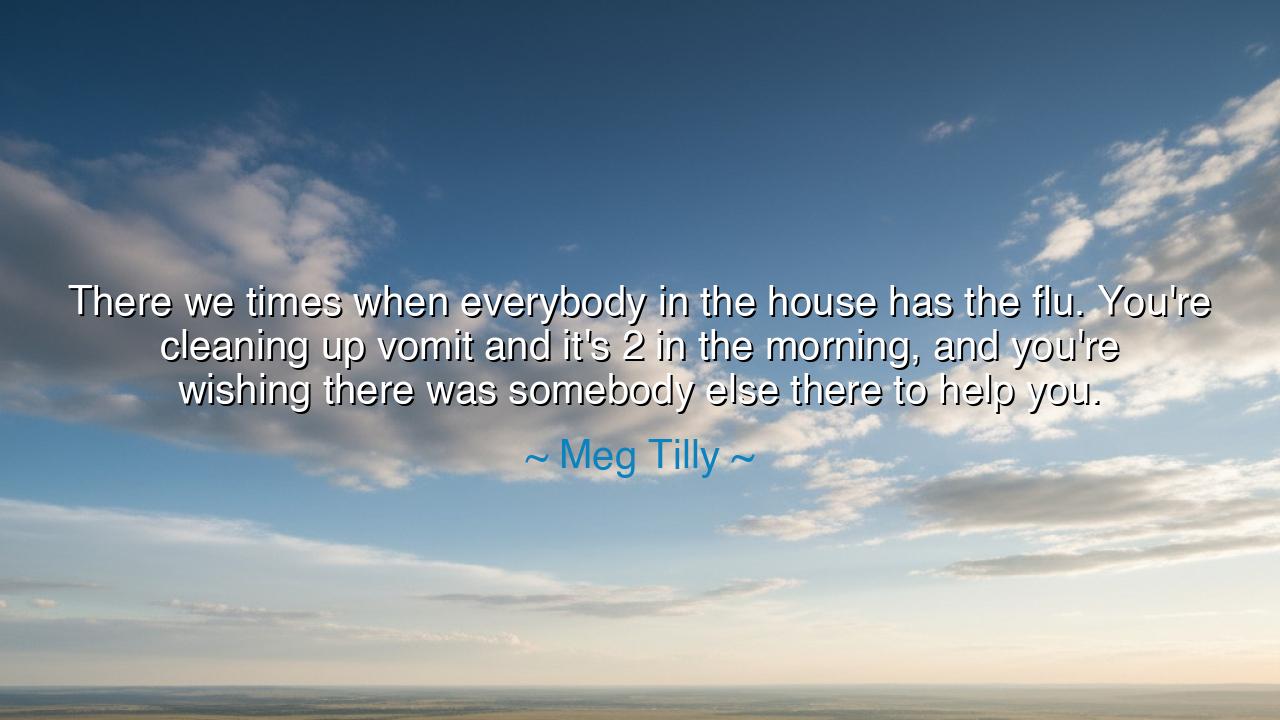
There we times when everybody in the house has the flu. You're
There we times when everybody in the house has the flu. You're cleaning up vomit and it's 2 in the morning, and you're wishing there was somebody else there to help you.






Hear the tender and weary voice of Meg Tilly, who spoke not of fame nor of fortune, but of the hidden battles waged in the quiet hours of the night. She said: “There were times when everybody in the house has the flu. You’re cleaning up vomit and it’s 2 in the morning, and you’re wishing there was somebody else there to help you.” In these words, wrapped in fatigue and longing, lies a truth as ancient as humanity itself: that the burdens of caregiving are both noble and crushing, that the unseen labors of love often demand more courage than any public triumph.
The meaning of her confession is profound. It is easy to cheer the hero on the battlefield, or to honor the champion on the stage. Yet who honors the parent or guardian, rising from their bed in the darkest hour to tend to the suffering of their children? Who praises the weary hands that mop the floor, or the trembling spirit that wishes for relief but finds none? Tilly reveals the sacredness of these hidden labors: though they seem small, they are the very foundation of love itself. Family is built not only in moments of joy, but in these nights of exhaustion, when duty outweighs desire, and love is proven in silence.
The origin of this truth lies in the eternal law of sacrifice. From the beginning of time, parents and caretakers have borne the hidden struggles of life to protect their kin. In ancient myths, heroes may have slain beasts, but in the real world, the noblest heroics were those of mothers, fathers, and guardians who shielded their children from sickness, hunger, and despair. Meg Tilly’s story is but a modern echo of this ancient truth: that love is not mere feeling, but service, often given at great cost.
History, too, bears witness. In the terrible days of the Black Plague, when death swept through cities, it was not only priests and physicians who fought despair, but parents who tended to their sick children with no hope for themselves. Many perished in the act of care, yet in their sacrifice was revealed the deepest measure of love. Like Tilly’s words, their story reminds us that the truest heroism is often hidden, unrecorded, yet eternal.
The lesson is clear: life will not always bring moments of glory, but it will surely bring moments of trial, when the world sleeps and you must rise to bear the burden. Do not despise these hours, for they are the forge of character. They shape endurance, compassion, and humility. To serve others in their weakness is not to lose dignity, but to gain it. For in those small, weary acts of service, one touches the divine.
Practical action must follow. When the long night comes, and you feel alone in your burden, remind yourself: This too is love. Seek strength not only in your own will, but in the knowledge that millions before you have borne the same task, and millions will after you. And when you see others carrying their unseen burdens, offer them kindness, encouragement, or a helping hand. For though love demands sacrifice, it should never demand isolation. Together, we are stronger.
And so, child of tomorrow, take this wisdom into your heart. The 2 a.m. labor, the cleaning, the tears—these are not small things, but the hidden bricks of love’s eternal house. Do not turn away from such tasks, for they crown you with the nobility of service. And remember always: the greatest strength is not shown in applause, but in quiet faithfulness when no one watches, when you wish for help, yet choose to endure for the sake of love.






AAdministratorAdministrator
Welcome, honored guests. Please leave a comment, we will respond soon